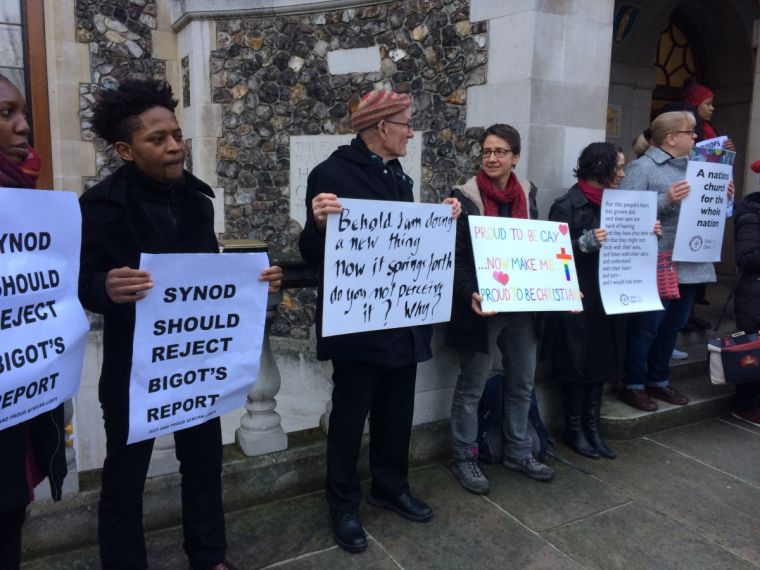Why The General Synod's Vote Last Night Was Bad For Everyone
Alternative truths abounded last night after the General Synod vote on the bishops' report on human sexuality came through and the House of Clergy voted by a narrow margin not to 'take note' of it.
Normally a Take Note motion is a neutral one and members of Synod debate a subject that they've been given an opportunity to talk about and then nod it through. Not so last night. Revisionists used a procedural Standing Order to force a vote in all three houses rather than just a simple show of hands. What this means is that the synod was asked to give approval by a clear majority in each of its three parts– the bishops, the clergy and the laity. It was in the House of Clergy that the Take Note motion failed – 100 voted no and only 93 voted yes. Even though the other two houses voted in favour, officially the synod voted no and so there was a 'victory' for the revisionists.
Or was there?
This morning's newspapers were full of 'one step closer to gay marriage in the Church of England' headlines, but this is just another example of synodical alternative facts. Let's actually stop and think about what the synod voted against.
The bishops' paper proposed creating a new theological teaching document on the issue of sex and marriage. The synod voted not to have that so we're still stuck with the 1987 Higton motion and the 1991 Issues in Human Sexuality as our doctrinal positions on homosexuality.

The bishops proposed to create pastoral responses to same-sex couples that were as wide and generous as possible. The synod voted not to have that so we're still stuck with the very limited pastoral responses that the bishops' pastoral statements on civil partnerships and same-sex marriages allow.
So far, it's not looking very good for the revisionists. But surely the vote last night was an indication the synod wanted something more liberal from the bishops than what was currently on the table? Not quite. Though there was a majority of seven against in the House of Clergy there was a majority of 23 in favour in the House of Laity, so when you take away the bishops who voted as a block in favour of their paper (apart from the Bishop of Coventry, who accidentally voted no), when you do the maths you see that the laity and clergy voted together by a majority of 16 in favour of the bishops' plans. Far from there being a groundswell in favour of a more liberal approach, what the synod actually said was that they were of a mind to do what the bishops wanted to do. This means that as the bishops pointed out in their paper, there is no consensus to move to a more liberal position and that's why they mapped out the best that they could possibly do in the murkiness of the situation we are in.
So despite the victory celebrations outside the entrance to Church House last night, there is actually no victory and nothing to celebrate for the revisionists. Neither is there a 'direction of travel' because in an ironic twist, there were two motions tabled for today if the take note debate had passed, one of which would have signalled a more conservative path, the other a more liberal path, and the bishops were going to use these to help guide them. These motions cannot now be debated and we are back to square one. As the bishops' document told us, the Church of England and its synod are split on this issue, practically down the middle, and there is no majority to liberalise or to become more conservative. Even the gay bishops didn't want a change. On top of that the LGB voice in the synod is itself split, with significant speeches for the first time from gay voices in the Houses of Clergy and Laity who hold to traditional teaching and applaud the bishops for wanting to do so too. We are many mansions in houses divided.
If people think that last night the synod gave birth to something new, it was an aborted effort, with all the tragedy that analogy brings with it. Past the fake news and post-truth headlines and spin, the simple fact is that the Church of England is going nowhere fast on the gay issue. We have no path forward at present. I am led to believe that the senior leaders in the House of Bishops understand the gravity of this situation and that they recognise that once you cut through the forest of media instant response there is actually no easy answer to the question of what to do next.
The bishops spent months wrestling with the seriousness of the conflict in the Church, working out what could and couldn't be done, processing through the various options and, in my humble opinion, bringing to the synod the best possible solution at the present time. It wasn't perfect, it wasn't what either side really wanted, but it was a genuine effort to try and shape a workable solution for the 21st century. As of last night, we're right back to where we were decades ago.
Dear synod members, be careful what you don't wish for, you may not get it.
Rev Peter Ould is a Church of England priest based in Canterbury. He blogs at www.peter-ould.net.











